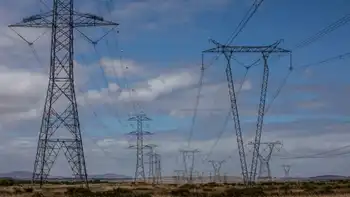Court ruling on mercury shakes up coal plants
By Electricity Forum
CSA Z463 Electrical Maintenance
Our customized live online or in‑person group training can be delivered to your staff at your location.

- Live Online
- 6 hours Instructor-led
- Group Training Available
The states identified with the most coal-fired power plants now up in the air are: Michigan (four), Wyoming (four), Illinois (three), Nevada (three), Ohio (three), Pennsylvania (three), Texas (three), Iowa (two), Kentucky (two), Louisiana (two), Georgia (one), New Mexico (one) and North Carolina (one).
The ruling will impact various aspects of three dozen or more coal-fired power plants, including some now already under construction.
Major coal-fired power plants impacted by the ruling include: LS Power White Pine (1500 MW - permit pending in Nevada); Sierra Ely (1500 MW - permit pending in Nevada); Toquop (850 MW - permit pending in Nevada) Desert Rock (Sithe Global’s 1500 MW in New Mexico); Longleaf (LS Power’s 1200 MW Plant in Georgia); Cliffside (Duke Energy’s 800 MW Plant in North Carolina); Alliant Marshalltown (600 MW – permit pending in Iowa); LS Power Waterloo (750 MW – permit pending in Iowa); AMP (1000 MW – permit challenged in Ohio); LS Power/Dynegy (750 MW in Michigan).
For a complete list of all 32 plants, go to http://www.nrdc.org.
Natural Resources Defense Council Clean Air Director/Senior Attorney John Walke said: “The court ruling will have far-reaching consequences for coal-fired power plant construction, permitting and pollution controls. This important new legal tool will increase the pollution control obligations for new coal-fired power plants, raise the already considerable expense of these projects, and add to the weight of arguments that the public deploys to oppose conventional coal-fired plants.”
Dr. Jennifer Sass, senior scientist, NRDC Public Health Program, said: "We need to remind that this is not just some fight in a court room. It also goes to the heart of a major public health crisis. Failing to clean up mercury pollution sentences our children to a life of lost opportunities. Mt. Sinai researchers have used data from the U.S. Centers for Disease Control and Prevention and studies that link elevated mercury levels with IQ loss to estimate that 300,000-600,000 children each year are born with mercury in their blood at levels associated with a loss of IQ.
The Mt. Sinai study limited its calculations to the costs associated with loss of intelligence only. There also are data from Europe suggesting that mercury poisoning is associated with increases in deaths from heart disease, which is the top killer in the United States."
In New Jersey v. U.S. EPA, No. 05-1162, the U.S. Court of Appeals for the D.C. Circuit vacated (overturned) two EPA mercury rules covering coal- and oil-fired power plants. Under the court ruling, power plants will need to install pollution control equipment to control not just mercury emissions but arsenic, lead, chromium and all other air toxics emitted from coal-burning. This legal tool will require a new and additional evaluation of pollution limits and control technologies covering all air toxics emitted by power plants, and will increase the pollution control obligations for new coal-fired power plants.
In 2005, EPA issued two highly controversial regulations covering just mercury emissions from coal-fired power plants: (1) a rule that removed such power plants from the list of industries requiring the Clean Air Act’s rigorous “Maximum Achievable Control Technology” (MACT) standards for each electric generation unit in the country to sharply reduce its toxic air pollution; and (2) a regulation that substituted a mercury pollution trading regime, which greatly weakened required mercury cuts from power plants, dispensed with the need to reduce mercury from each electric generation unit in the country, and walked away from regulating all other forms of toxic air pollution from power plants.
EPAÂ’s mercury pollution trading rule also stretched out full compliance with the trading scheme until the mid-2020Â’s, rather than requiring full compliance with more protective MACT standards by no later than 2008.
Before EPA illegally removed power plants from the regulatory list requiring adoption of MACT standards, each new coal-fired power plants proposed for construction starting in 2001 was required to be controlled to levels no less stringent than MACT, established by permitting authorities in the plantÂ’s preconstruction permit.
Several states issued preconstruction permits for new coal-fired power plants between 2001 and 2005 containing mercury emissions limitations that were far more stringent than the weak mercury limits that EPAÂ’s 2005 mercury rule applied to new coal-fired power plants: EPAÂ’s trading rule allowed anywhere from 4 to 20 times more mercury from new coal-fired power plants than these state permit mercury limits. The courtÂ’s ruling makes clear that power plants remain on the regulatory list requiring adoption of stringent MACT standards and pollution controls for all new coal-fired power plants.











